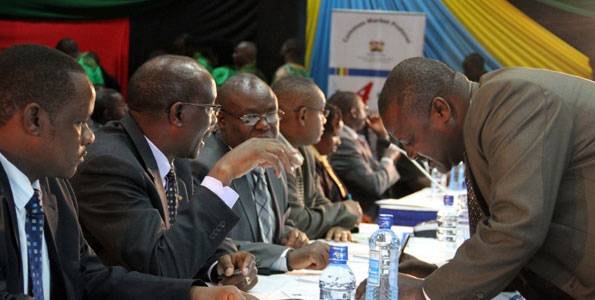Experts attack EU trade deal deadline

The Observer | 5 June 2014
Experts attack EU trade deal deadline
Written by Joseph Olanyo
At a high level regional multi-stakeholder conference on the EAC-EU EPA negotiations in Entebbe recently, experts in trade and regional integration, argued that the EAC should not be bound by the pressure of the EU deadline, rather it should be bound by policy space and flexibilities.
“EPA is about a resource war; It’s not about getting market access for fowls to Europe. It has been camouflaged as a market issue. Never negotiate out of fear. If the EU doesn’t get the resources then they are finished,” said Prof Yash Tandon, a former executive director of South Centre, an intergovernmental think-tank of the developing countries.
“We are standing at that threshold in history where we can make a difference. I am praying that let EU impose sanctions on us. That would be very good for us and it will be the beginning of the collapse of the empire,” he added.
In his key note address, Peter Kiguta, the director general Customs and Trade at the EAC Secretariat, said the EPA should not come and disintegrate the EAC region. In less than six months, the European Union (EU) wants the East African Community (EAC) partner states to sign a trade deal with them.
The EU has put a deadline and a condition that any African, Caribbean and Pacific (ACP) country that will not have signed and ratified the EAC-EU Economic Partnership Agreement (EPA) by October 1, 2014, will be removed from its list of beneficiaries of the duty-free quota preferential market. But the EU’s deadline is facing stiff resistance from stakeholders in the EAC region, who say the EPA should not be finalized until the outstanding issues in the agreement are satisfactorily resolved and agreed upon.
The EU, on its part, insists that the pending issues such as duties and taxes on exports are not very significant and must therefore not delay the signing. EPAs are trade negotiations which were launched in 2002 to create a free trade area between the EU and the ACP Group of States under the Cotonou Partnership Agreement (CPA).
In a bid to strengthen their regional integration, the five EAC partner states, in 2007, decided to reconfigure and negotiate the EPAs as a bloc. They subsequently initiated an interim Framework Economic Partnership Agreement (FEPA) between the EAC and EU in Kampala, in November 2007. EPA was supposed to be signed in 2008.
Whereas the negotiations have reached a critical stage, some issues are still pending. The outstanding issues in the agreement are: duties and taxes on exports, agriculture (domestic support and export subsidies) and relations with the Cotonou Agreement.
Under the export clause, the EU disallows the EAC partner states to impose new export taxes, which analysts say are an indispensable development tool used to create incentives for value addition to local products. A sticky issue under agriculture is the subsidies provided in the EU and the weak safeguard provided in the EPAs. The EU has reportedly rejected the discussion of its agricultural subsidies in the EPAs on grounds that it is a World Trade Organisation issue.
Economic policy and trade analysts argue that the remaining outstanding issues, if not resolved, will negatively affect the future development of the EAC. Mussa Billegeya, the programmes officer at the Eastern and Southern Africa Farmers Forum (ESAFF), Tanzania, said the problems the region has today are not because of EPA and neither will they be solved by signing the EPA.
“Deadlines are about fears. We are being driven by fears of missing the deadline, not logic as we approach the EPA deadline,” Billegeya said.
Europe’s bid to protect itself against emerging economies such as India and China has been cited as the biggest point frustrating the negotiations. Trade negotiators say the delay in concluding the talks has further been caused by a disagreement over the inclusion of the Most Favoured Nation (MFN) clause.
The MFN clause, if included in an EPA, would require the EAC to extend to the EU the same preferences it grants to third parties under future trade agreements. If signed, the MFN will prevent all the signatories from entering into bilateral talks with other partners in areas where the EU does not enjoy preferential terms.
Ambassador Nathan Irumba, Uganda’s former envoy to the WTO, said most of the region’s exports are primary commodities that are zero rated. However, he added, the EAC seems to value so much what is already zero rated.
“The EU is an elusive market. It’s negotiating with everybody in the world and is granting the same preferences to other players. There are trading opportunities in other emerging markets beyond the EU,” Irumba said.





